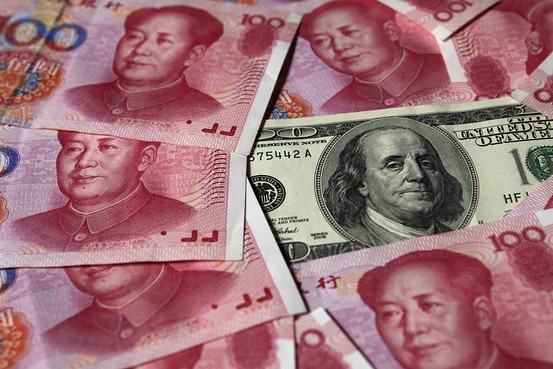(单词翻译:单击)
For those frustrated by slow progress towards freeing up China’s tightly controlled currency, recent days provide an illustration of why authorities are determined to proceed with caution.
对于那些认为中国放松汇率严格管制进程缓慢令人失望的人来说,最近几天的情形说明了中国当局为何坚决谨慎推进这一进程。
Emerging market currencies hit a 14-year low against the dollar this week, hit by concerns about rising debt and slowing exports in emerging markets.
受到对新兴市场债务上升和出口放缓担忧的影响,新兴市场货币兑美元汇率本周创下14年来的低点。

Yet amid the turmoil the renminbi has been a relative bastion of stability. Even as the currency hit its weakest level against the dollar in four months on Tuesday at Rmb6.21, it was only a modest 1.6 per cent weaker than the seven-month high touched on October 31. By contrast, the JPMorgan Emerging Markets Currency Index fell 5 per cent over the same period.
然而,在一片震荡之中,人民币一直岿然不动,保持着相对的稳定。即使人民币兑美元汇率上周二触及6.21,创下4个月以来的最弱水平,这也只比10月31日触及的7个月来的最高点下跌仅1.6%。相比之下,同期摩根大通新兴市场货币指数(JPMorgan Emerging Markets Currency Index)下跌了5%。
“The jump in USD-RMB in the last two days is sharp by the currency’s own standards,” Wang Ju, forex strategist at HSBC, wrote on Tuesday. “However, given the movements in the rest of Asia, this partially represents a catch up with the likes of the Malaysian ringgit and the Korean won.”
“按人民币自身的标准来看,过去两天美元兑人民币汇率的突升是剧烈的,”汇丰(HSBC)资深外汇策略师王菊周二写道。“不过,考虑到亚洲其他地区货币的波动情况,这部分地反映了人民币在追赶马来西亚林吉特和韩元等货币的脚步。”
Top Communist party leaders pledged in a landmark blueprint for economic reform last November to give market forces a “decisive role” in resource allocation. The plan contained an explicit reference to the exchange rate.
在去年11月发布的具有里程碑意义的经济改革蓝图中,共产党最高领导层承诺要让市场力量在资源配置中起“决定性作用”。该计划明确提到了汇率。
Yet despite such pledges, China’s management of its currency in recent days makes clear that authorities remain far from willing to fully deregulate the exchange rate or allow speculators free rein to send waves of capital sloshing in and out.
然而,尽管做出了这样的承诺,近日来中国对人民币汇率的管理明显表现出,当局仍远非愿意完全解除汇率管制或让投机者自由地操纵资本大量进出。
That means China is not about to witness the type of exchange rate moves common among its emerging market peers. Indeed, the memory of the 1997 Asian financial crisis, when China’s neighbours experienced uncontrolled capital flight and massive currency devaluation, remains fresh in the minds of senior policy makers.
这意味着在其他新兴市场常见的汇率波动情形不会在中国上演。事实上,1997年亚洲金融危机时,中国的邻国遭遇资本外逃失控和货币大规模贬值的情形,仍鲜活地留在中国高层决策者的脑海中。
The People’s Bank of China’s stabilising influence on the exchange rate is clear from the deployment of its daily fixing in recent days to restrain the renminbi’s decline.
中国央行对稳定汇率发挥的影响明显表现为,其近日每天设定的汇率中间价都旨在抑制人民币下跌。
The central parity rate, which signals the central bank’s intention for the exchange rate, is a midpoint from which the spot rate is permitted to fluctuate by 2 per cent above or below.
体现央行希望汇率处于何种水平的汇率中间价是一个中间点,即期汇率被允许在这一点上下2%的幅度内浮动。
For most of the period since China’s landmark depegging of its currency in 2005, the renminbi’s spot rate consistently traded stronger than the midpoint, a sign that the fixing was acting as a check on market pressure pushing the renminbi higher.
2005年人民币与美元标志性脱钩之后的大部分时间里,人民币即期汇率一直高于中间价成交,表明中间价的设定扮演了平衡推动人民币升值的市场压力的角色。
But this pattern reversed late last month, after China slashed benchmark interest rates in an attempt to boost its economy, which is on course for its slowest full-year growth since 1990. The rate cut also coincided with an acceleration of the fall in other emerging market currencies that began in July.
但是,上个月底中国为了刺激经济而下调基准利率后,上述这种模式开始逆转。中国经济今年全年增速预计将是自1990年以来最低的。自7月开始,其他新兴市场货币汇率开始下跌,中国此次降息也恰逢这些货币开始加速贬值。
Even as the spot rate weakened, the central bank set a series of progressively stronger midpoints, widening the gap between spot and fixing. While some viewed this divergence as a tug of war between the central bank and the market, the PBoC’s move was an effort more to moderate the renminbi’s fall than to actively pull it stronger.
即便在即期汇率走软之际,中国央行仍然接二连三地逐步上调中间价,扩大了即期汇率与中间价之间的差价。尽管一些人将这种差价视为央行和市场之间的拉锯战,但中国央行此举更多地是为了减缓人民币的下跌,而非积极推动其上涨。
“There are often times when the spot rate will depreciate, but the midpoint doesn’t follow the market downward. This indicates the central bank is sending a signal of stability to the market,” said Xie Yaxuan, economist at China Merchants Securities.
中国招商证券(China Merchants Securities)的经济学家谢亚轩表示:“往往会出现即期汇率下跌,但中间价并未跟随市场向下走的情况。这表明央行在向市场传达稳定的信号。”
The PBoC has probably also intervened in the market directly. Forex traders said they saw concerted renminbi buying by big state banks on Tuesday afternoon, following a big drop in the renminbi that morning.
中国央行也可能对市场进行了直接干预。外汇交易员们表示,周二上午人民币汇率大幅下挫,当天下午,他们看到大型国有银行集体买入了人民币。
Such action typically signals the central bank’s presence in the market.
此类举措通常是央行的身影出现在市场上的信号。
While few expect rapid devaluation in the near term, many investors are starting to question the conventional wisdom that the Chinese currency is a one-way bet to appreciate.
尽管很少有人预计人民币会在近期快速贬值,但许多投资者开始质疑认为人民币只会单向升值的传统观点。
Entrenched appreciation expectations are easy to understand. Apart from 2009, following the PBoC’s temporary return to a dollar peg during the height of the financial crisis, the renminbi has risen against the US currency every year since 2005. In a period when dollar, euro and yen interest rates were all near zero, higher yields available on renminbi assets added to the lure of the currency.
不难理解根深蒂固的人民币升值预期。除了在2009年、金融危机最危急时分,中国央行临时恢复人民币盯住美元汇率以外,人民币兑美元汇率自2005年以来每年都在升值。眼下美元、欧元和日元利率全都接近为零,人民币资产的较高收益率增加了人民币的吸引力。
Now, however, some investors believe a new era of renminbi depreciation may be at hand, especially with the prospect of rate rises by the Federal Reserve next year. The renminbi is now down 2.1 per cent year-to-date in 2014.
然而,现在一些投资者相信,人民币贬值的新时代可能即将来临,尤其是在美联储(Fed)明年可能加息的前景下。2014年迄今,人民币汇率已累计下跌2.1%。
Chris Morrison, portfolio manager of Omni Macro, a London-based hedge fund with $650m under management, estimates that China’s currency has appreciated by 45 per cent in inflation-adjusted, trade-weighted terms over the past five years. Omni took short positions in the offshore renminbi (CNH) market starting in January.
Omni Macro的投资组合经理克里斯•莫里森(Chris Morrison)估计,经通胀因素调整后的人民币贸易加权汇率在过去5年已累计上升45%。Omni Macro是一家总部位于伦敦的对冲基金,旗下管理着6.5亿美元资产。该公司从今年1月开始在离岸人民币市场建立了空头仓位。
“When you have an expensive currency that’s heavily owned for reasons of carry and then the economy slows and the central bank cuts rates, that’s a recipe for currency depreciation,” says Mr Morrison.
莫里森表示:“当一种汇率较高的货币之前因套息原因被大量持有,而接下来经济放缓,央行降息时,这种货币就该贬值了。”
While many have assumed that China’s large trade surpluses inoculate the renminbi against depreciation, Mr Morrison points to the euro today and the Swiss franc in 2011 as cases where a currency depreciates despite current account inflows.
尽管许多人认为,中国的巨额贸易顺差将会防止人民币贬值,但莫里森以如今的欧元和2011年的瑞士法郎为例说明,尽管经常账户是顺差,货币也是会贬值的。
“Your macroeconomic policy objectives have got to be coherent with your FX policy. You cannot be in a situation where you want to ease policy and also have exchange rate appreciation. Those things don’t make sense together,” he said.
他表示:“你的宏观经济政策目标必须与外汇政策目标保持一致。你不可能既想要宽松政策,又让汇率升值。把这两样东西组合在一起是没道理的。”


